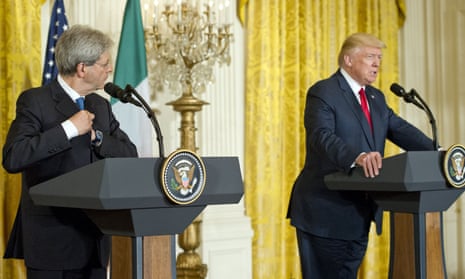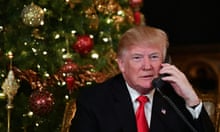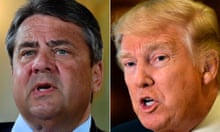Donald Trump’s declaration that the US had “no role” in Libya has raised doubts about whether a political compromise can still be reached with the help of Americans in the embattled oil-rich country, possibly opening the door to greater Russian involvement in the region.
Speaking at a joint press conference on Thursday, the US president rejected a plea from the Italian prime minister, Paolo Gentiloni, for the US to maintain its “very critical” role in the country and help build political consensus around the struggling UN-backed government in Tripoli, which Italy has said represents the best long-term hope for stability.
“I do not see a role in Libya. I think the United States has right now enough roles. We are in a role everywhere,” Trump said, adding that the US’s priority in Libya and Iraq was to focus on counter-terrorism efforts to target Isis.
The remarks represented the first time since he became president that Trump had commented publicly on the situation in Libya, a country that is the main departure point for hundreds of thousands of migrants heading to Europe from Africa and the Middle East and is locked in civil strife between warring political factions and tribes.
Diplomats and analysts who closely follow developments in Libya said it was not entirely clear whether the president was signalling a break from the US’s strong support of the Tripoli government led by Fayez al-Sarraj, or whether he was simply stating that he did not envisage the US taking an active military role in the country.
Mattia Toaldo from the European Council on Foreign Relations, a thinktank, said Trump’s statement would in effect leave Russia, Egypt and Algeria to help arrange a settlement in Libya. A rival government in eastern Libya, led by Khalifa Haftar, an anti-Islamist military strongman, has support from some parts of the Egyptian and Russian governments.
“You are in a situation where the US backs off from the political process, the UN is extremely weak, the French and the British are having elections, and the Italians were basically pushed aside. So who is left?” Toaldo said. “Egypt, Russia, and Algeria.”
Even as Trump appeared to be adopting a position in which the US views Libya as piece of a broader regional counter-terrorism strategy – without engaging in efforts at political reconciliation – Russia had adopted a “more sophisticated strategy”, Toaldo said. The government of Vladimir Putin had been seen as backing Haftar, but it has also made recent efforts to engage forces that oppose the general.
Italian diplomatic sources have watched Russia’s involvement with some concern, in part because Russia’s presence in Libya will strengthen Putin’s influence over the region.
Another diplomatic source whose government supports the Tripoli government suggested it was too early to say the Trump administration was fully disengaging from Libya, and pointed to recent remarks by the US ambassador to the United Nations, Nikki Haley, who this week said she supported a “political solution with all parties”.
“We want to see the parties come together, have one political solution, one government, one military, so the Libyan people can move forward,” Haley said.
The British ambassador to Libya, Peter Millett, said he expected to discuss the issue with US counterparts but declined to comment further.
Trump’s remarks were welcomed by an official who represents Aguila Saleh Issa, the head of the Libyan house of representatives in Tobruk, in eastern Libya. Ari Ben-Menashe, a security consultant based in Canada who has a $6m lobbying contract with Saleh Issa and has tried to convince the Trump administration to drop support for Sarraj, said the US president’s remarks made clear that “the US is actively not intervening on behalf of al-Sarraj”.









